人教版九年级英语全一册 Unit 13 We're trying to save the earth! Section A(3a-4c)课件(共90张 PPT)
文档属性
| 名称 | 人教版九年级英语全一册 Unit 13 We're trying to save the earth! Section A(3a-4c)课件(共90张 PPT) | 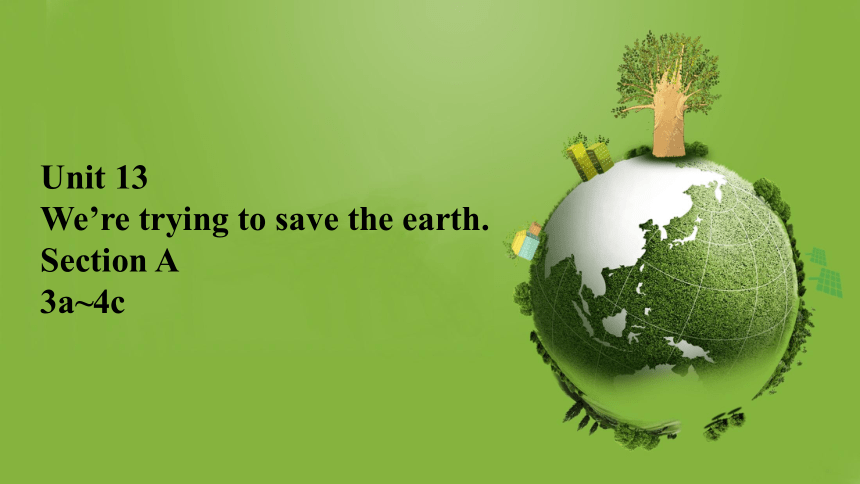 | |
| 格式 | zip | ||
| 文件大小 | 11.5MB | ||
| 资源类型 | 教案 | ||
| 版本资源 | 人教新目标(Go for it)版 | ||
| 科目 | 英语 | ||
| 更新时间 | 2022-07-25 14:18:42 | ||
图片预览

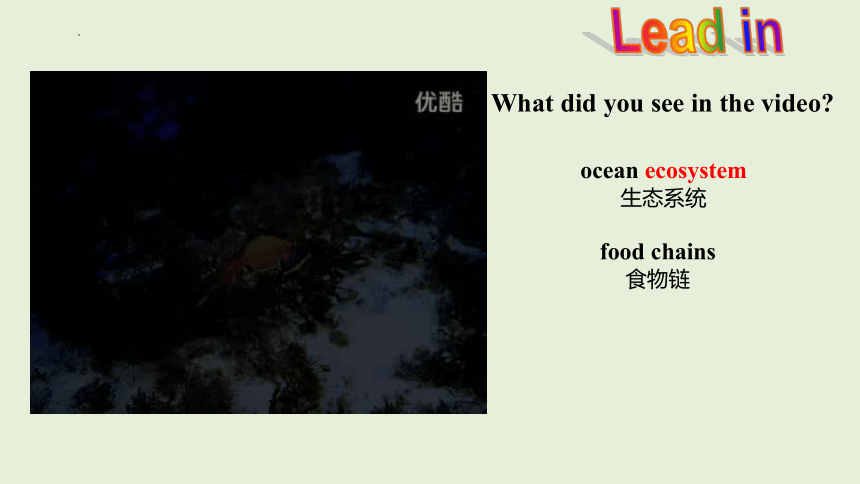
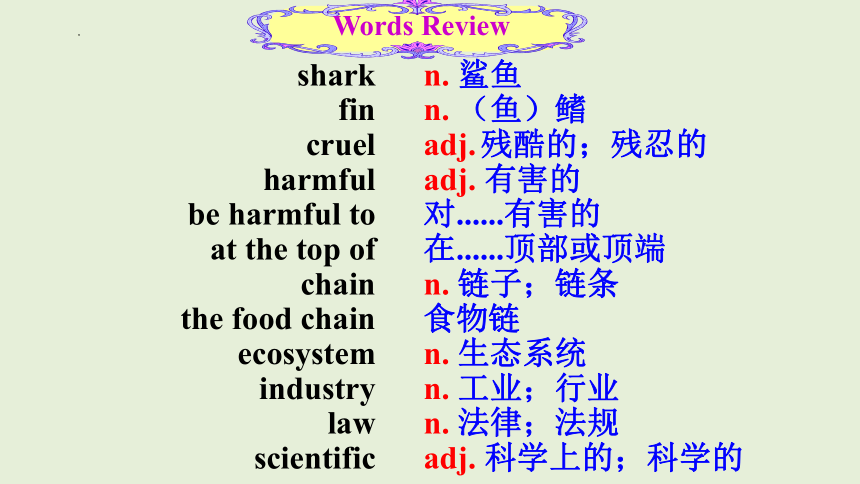
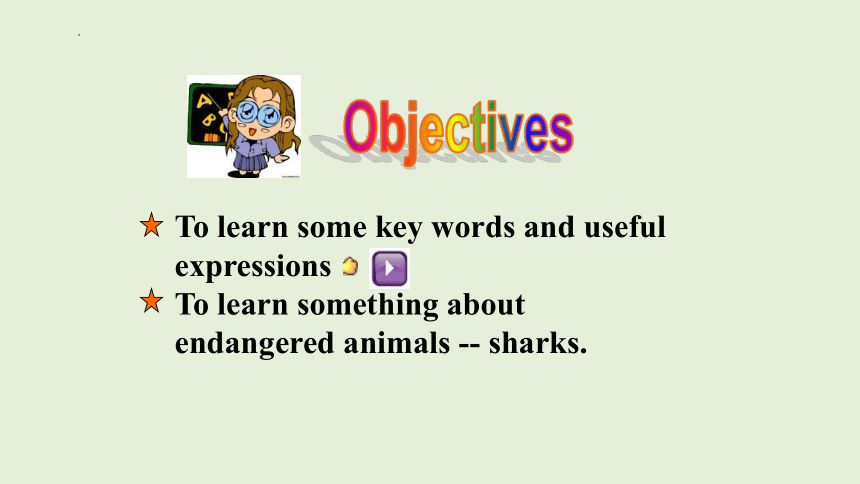
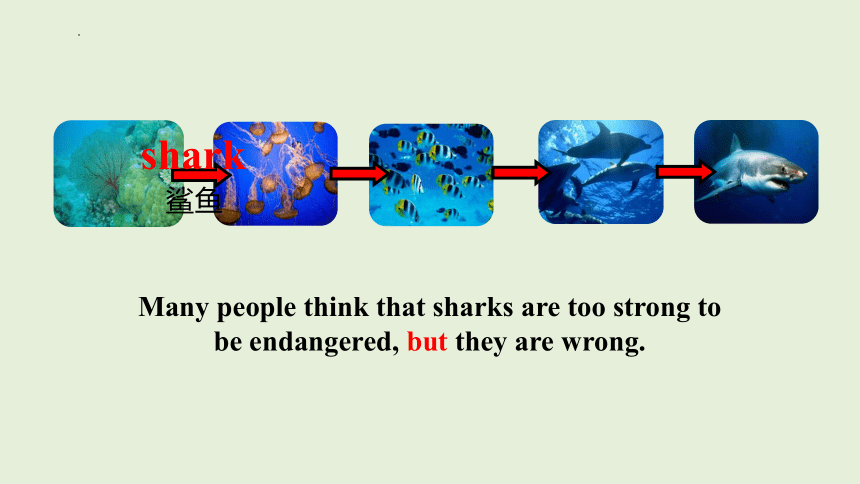
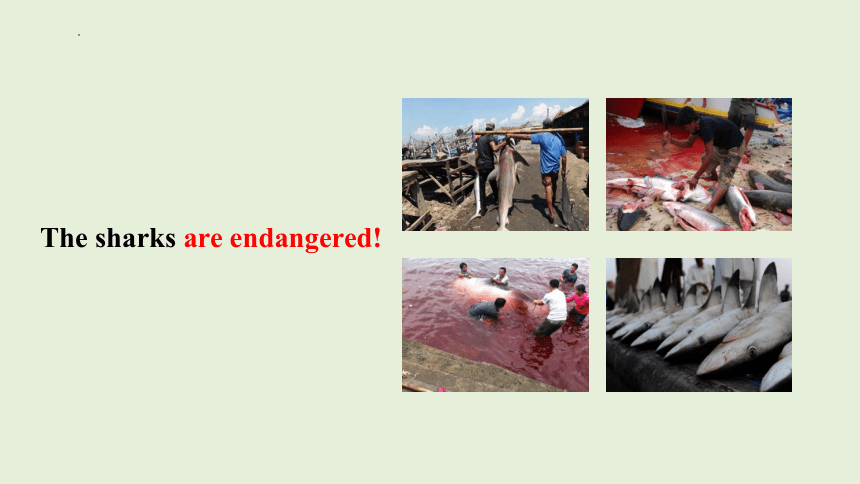
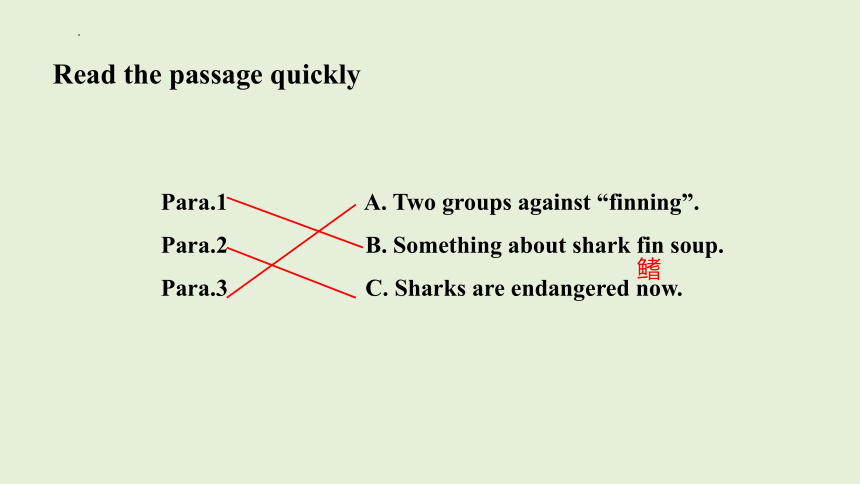
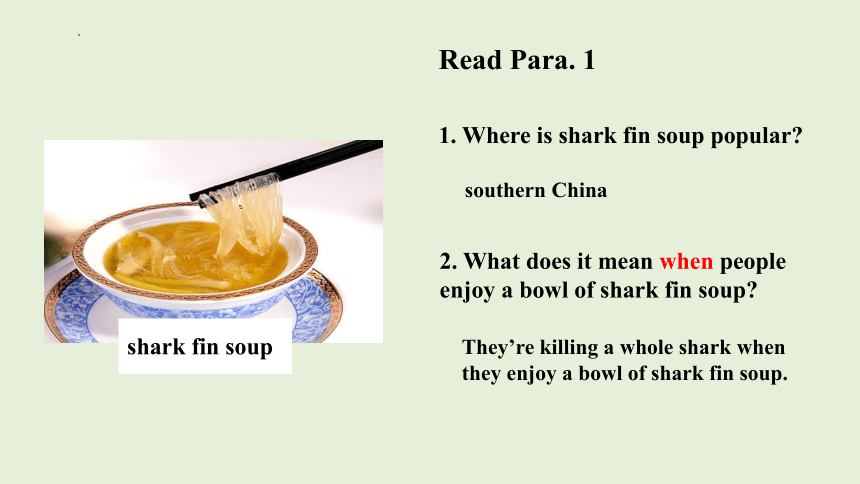
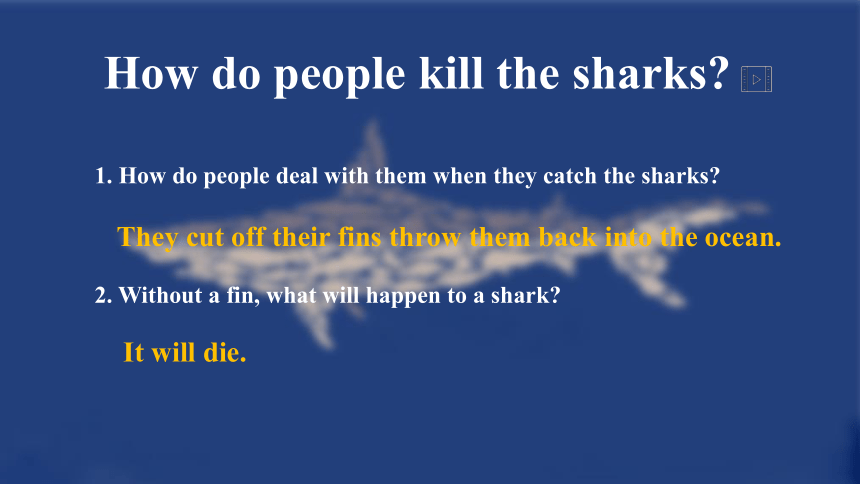
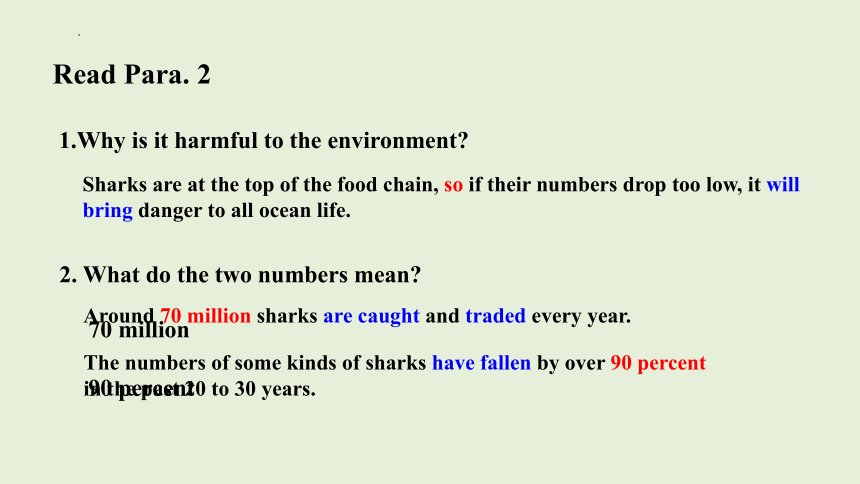
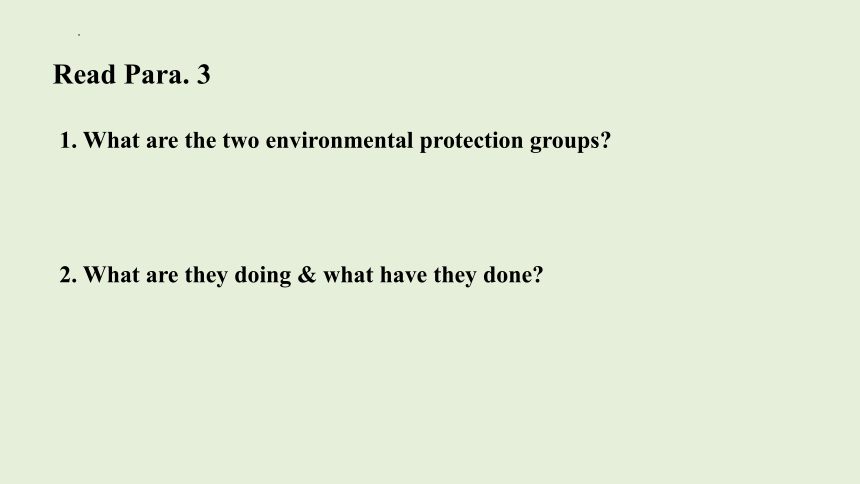
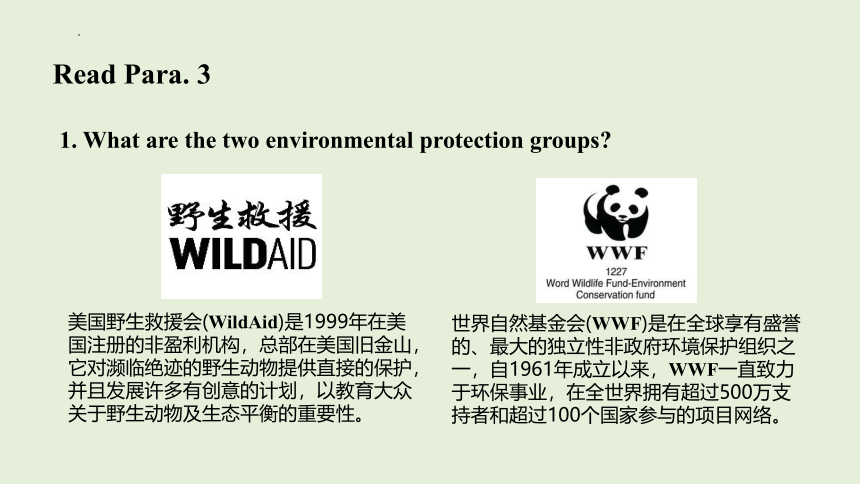
文档简介
(共90张PPT)
Unit 13
We’re trying to save the earth.
Section A
3a~4c
What did you see in the video
food chains 食物链
ocean ecosystem 生态系统
Lead in
shark
fin
cruel
harmful
be harmful to
at the top of
chain
the food chain
ecosystem
industry
law
scientific
n. 鲨鱼
n. (鱼)鳍
adj. 残酷的;残忍的
adj. 有害的
对......有害的
在......顶部或顶端
n. 链子;链条
食物链
n. 生态系统
n. 工业;行业
n. 法律;法规
adj. 科学上的;科学的
Words Review
Objectives
To learn some key words and useful expressions
To learn something about endangered animals -- sharks.
shark
鲨鱼
Many people think that sharks are too strong to be endangered, but they are wrong.
The sharks are endangered!
Read the passage quickly
Para.1 A. Two groups against “finning”.
Para.2 B. Something about shark fin soup.
Para.3 C. Sharks are endangered now.
鳍
shark fin soup
1. Where is shark fin soup popular
2. What does it mean when people enjoy a bowl of shark fin soup
Read Para. 1
southern China
They’re killing a whole shark when
they enjoy a bowl of shark fin soup.
How do people kill the sharks
1. How do people deal with them when they catch the sharks
2. Without a fin, what will happen to a shark
They cut off their fins throw them back into the ocean.
It will die.
Read Para. 2
1.Why is it harmful to the environment
2. What do the two numbers mean
70 million
90 percent
Sharks are at the top of the food chain, so if their numbers drop too low, it will bring danger to all ocean life.
Around 70 million sharks are caught and traded every year.
The numbers of some kinds of sharks have fallen by over 90 percent
in the past 20 to 30 years.
Read Para. 3
2. What are they doing & what have they done
1. What are the two environmental protection groups
Read Para. 3
1. What are the two environmental protection groups
美国野生救援会(WildAid)是1999年在美国注册的非盈利机构,总部在美国旧金山,
它对濒临绝迹的野生动物提供直接的保护,并且发展许多有创意的计划,以教育大众关于野生动物及生态平衡的重要性。
世界自然基金会(WWF)是在全球享有盛誉的、最大的独立性非政府环境保护组织之一,自1961年成立以来,WWF一直致力于环保事业,在全世界拥有超过500万支持者和超过100个国家参与的项目网络。
Read Para. 3
2. What are they doing & what have they done
They are teaching the public about “finning”.
They have even asked governments to develop laws(法律) to stop the sale of shark fins.
Are the shark fins good for health?
No scientific studies have shown that shark fins are good for health.
No sale no killing.
没有买卖,就没有杀害。
Protecting wild animals is just protecting ourselves.
保护野生动物就是保护我们人类自己。
Don’t let our children can only see today’s animals in the museums.
不要让我们的孩子只能在博物馆里才能见到今天的动物。
1. A shark can no longer swim and slowly dies. 鲨鱼不能再游泳然后慢慢死掉。
no longer &no more “不再”
no longer和not…any longer 侧重时间
not…any more 侧重程度和数量
Exploration
I’m no longer a student.
我不再是个学生了。
You can drink no more. = You can’t drink any more.
你不能再喝了。(喝酒的量到了一定程度,不能再继续下去了。)
2. This method is not only cruel, but also harmful to the environment.这种方法不但残忍而且对环境有害。
not only…but also…
表示并列,着重强调后者,“不仅……而且……” (also 可省略)
若连接两个成分作主语,其谓语通常与靠近的主语保持一致
not only放在句首,后接句子时要用倒装结构
She not only plays well, but also writes music.
她不仅很会演奏,而且还会作曲。
Not only men but also women were chosen.
不仅仅是男的,女的也有被选中的。
Not only had the poor man been fined, but also he had been sent to prison.
这个可怜的人不仅被罚款,而且还被送进了监狱。
【运用】
同义句转换,每空一词。
(1) She and I have already been to Beijing.
____ ____ she ____ ____ I have already been to Beijing.
(2) He likes to swim and he wants to teach the kids to swim, too.
Not only ____ __ ____ to swim, ____ he wants to teach the kids to swim.
Not only but also
does he like
but
(3) The twins were late this morning. Sam
was late this morning, too.
Not only the twins ____ ____ Sam ____
late this morning.
____ ____ Sam but also the
twins _____ late this morning.
but also
was
Not only
were
be harmful to 对… 有害
Smoking is harmful to the health.
吸烟有损健康。
Playing computer games much is harmful to students.
电脑游戏玩太多对学生有害。
3. Sharks are at the top of the food chain in the ocean’s ecosystem.
鲨鱼位于海洋生物系统食物链的顶部。
at the top of 在...最高地位; 用最高[最大]的(速度, 声音等)
I looked at the top of his head, his hair shiny and parted smoothly.
我看他的头顶, 头发光亮, 分得平滑。
He shouted at the top of his voice in order that he might be heard.
他尽力大声叫喊, 以便别人能听见。
4. If their numbers drop too low, it will bring danger to all ocean life.
此句复数形式的number表达全海洋中鲨鱼的总量。当表示数值的高或低时,number要用high或low修饰
常与number搭配的动词:grow, fall
In that country, the number of children going to school is higher in cities than in towns and village.
在那个国家,城市儿童入学人数比乡镇及农村要高。
Translate and write them down.
甚至是河底都满是垃圾。
2.这个方法不仅残酷还对环境有害。
3.鲨鱼处于海洋食物链的顶部。
Even the bottom of the river was full of
rubbish. .
This is not only cruel, but also harmful
to the environment.
Sharks are at the top of the food chain
in the ocean’s ecosystem.
Exercises
Check if you know these phrases.
1.把垃圾扔到河里
2.在…中起作用
3.在中国南部 4.对……有害
5.在……顶部 6.海洋生态系统
throw the rubbish into the river
play a part in
in southern China
be harmful to
at the top of
the ocean’s ecosystem
take part in
afford
turn off
reusable
pay for
take action
transportation
参加
v. 买的起;承担的起(后果)
关掉
adj. 可重复使用的
付费;付出代价
采取行动
n. 运输业;交通运输
Words Review
Pay attention to the sentences.
1. We’re trying to save the earth.
2. The river used to be so clean.
3. The air is badly polluted.
4. No scientific studies have shown that shark fins are good for health.
5. We should help save the sharks.
Present progressive
used to
Passive voice
Present perfect
Grammar Focus
Modal verbs
Grammar focus
用括号内所给动词的适当形式填空。
Listen! The phone __________(ring). Please go to answer it.
— Alan, it’s late. Why not go to bed
— Jenny hasn’t come back yet. I
___________(wait) for her.
3. — What’s your father doing now
— He __________ (write) a letter in the
study.
is ringing
am waiting
is writing
Self learning
① 肯定句: 主语 + am/is/are + -ing
② 否定句: 主语 + am/is/are + not + -ing
③ 疑问句: Am/Is/Are + 主语 + -ing
现在进行时
现在进行时表示现在或现阶段正在进行或发生的动作。
现在进行时--基本结构
Exploration 1
表示说话时正在进行的,目前正在发生的动作。常带有表示目前时刻的时间副词, 如:now, at the (very) moment, for the time being, at present, 及Look! Listen! ...
① Look! The big bird is flying away.
看,那只大鸟正在飞走。
② He is watching a movie now.
他现在正在看电影。
现在进行时--用法
2) 表示目前一段时间内正在进行,但
说话时可能没有进行的动作。
Right now I am studying Chinese by distance learning.
我现在正通过远程教育学习汉语。
现在进行时--用法
3) 与always, constantly, forever, all the
time等副词连用,表示动作反复或习
惯。此时句子常含有说话者的强烈
情感在内。表达较强的“责备”或“表扬”之意。
① You are always changing your mind.
你总是主意不定。(太烦人了。)
② He is always helping others.
他总是帮助别人。(他真是个好人。)
现在进行时--用法
4) 对于come, go, leave, arrive, start等
表示位置移动的动词常可用进行时
态表将来。
① He is leaving on Wednesday.
他将于周三离开。
② Mary isn’t here at the moment.
She is coming later.
玛丽现在不在这儿,她一会儿来。
现在进行时--用法
— I called you at 4:00 yesterday
afternoon, but no one answered.
— Sorry, I ______ with my friends at that
time.
A. swim B. swam
C. will swim D. was swimming
考点例析
【考点点拨】
★ 过去进行时表示过去某一时刻或某阶
段正在进行的动作,其谓语由“was /
were + 现在分词”构成。
★ 常与过去进行时连用的时间状语有:
then, at that time, this time yesterday, at
ten yesterday等。
现在进行时: Present progressive
结构: be (am/is/are) + v.-ing
标志词:Look, Listen, now, right now…
e.g. Look! The boy is crying.
定义:表示说话时(瞬间)正在进行的动作, 也表示目前或现阶段正在进行的动作。
What a fine day today!
Look! What are they doing
Exercise
Jenny used to play the piano.
用used to句型说出与图片情景相符的句子。
Jenny
Mike used to wear glasses.
Mike, glasses
Peter used to play soccer.
Peter, soccer
Amy, long hair
Amy used to have long hair.
Mark used to like swimming.
Mark, like swim
used to “__________”, 表示___________
used to + ___________
对比现在和过去: _____________________
____________________________________
过去的习惯
过去常常
动词原形
but not any more, but not any longer
but now …,
Exploration 2
翻译下列句子。
艾米以前是短头发吗?
你以前常在学校吃午餐吗?
他过去不戴眼镜。
这些商店过去在周日是不营业的。
他以前很高,是吗?
Did Amy use to have short hair
Did you use to have lunch at school
He didn’t use to wear glasses.
The shop usedn’t to open on Sundays.
He used to be very tall, didn’t he
used to 的否定句和疑问句
否定句:
didn’t use to … /used not to …
一般疑问句:
Did you use to... /Used you to …
变反意疑问句,附加疑问部分可用didn’t /usedn’t 或did / used
She used not to like tests.
Used you to be popular in school
They usedn’t to go skating, did they
定义
*used to “过去常常”, 表过去的习惯
*used to + 动词原形
*对比现在和过去: but now …,but not
any more, but not any longer
句式
*否定句:
didn’t use to … /used not to …
*一般疑问句:
Did you use to... /Used you to …
*变反意疑问句,附加疑问部分可用 didn’t /usedn’t 或did / used
used to
used to do sth. 表示过去常常做某事, 而现
在往往不做了, 后接动词原
形。
be used to doing sth. 表示习惯于做某事
e.g. I used to get up at six o’clock.
Joe is used to drinking a cup of coffee every morning.
used to do与be used to doing
Translation.
1. 她过去常常周末和朋友闲逛。
She used to hang out with friends on weekends.
2. 他习惯晚睡。
He is used to staying up.
Exercise
被动语态表示主语是谓语动作的承受
者,被动语态由“be + 过去分词”构成。be随着主语人称和数以及时态的不同而变化。含有情态动词的被动语态由“can / must / may / should … + be + 过去分词”构成。
被动语态
Exploration 3
The first section of New College
English is designed for speaking practice
and is based on pictures and topics.
These computers were made in our own country last year.
Shall we be asked to attend the opening ceremony
①一般现在时的被动语态:am/is/are + 过去分词
②一般过去时的被动语态:was/were+过去分词
③一般将来时的被动语态:will/shall+be+过去分词
1. 有些动词可以有两个宾语,在用于被动结构时,可以把主动结构中的一个宾语变为主语,另一宾语仍然保留在谓语后面。通常变为主语的是间接宾语(指人的宾语)。
一些特殊的被动语态
They didn’t offer Ann the job.
Ann wasn’t offered the job.
2. 在使役动词have, make, get以及感官动词see, watch, notice, hear, feel, observe等后面不定式作宾语补语时,在主动结构中不定式to要省略,但变为被动结构时,要加 to。
They make her clean the floor.
She is made to clean the floor by them.
3. It + be + 过去分词 + that从句 (=主语+ be + 过去分词 + to do sth.)
表示:据说/据报道/据悉/据信等……
据说这个男孩已经通过了这次全国性的测试。
It is said that the boy has passed the
national exam.
The boy is said to have passed the
national exam.
1. 某些感官动词加形容词及少数其他的动词本身可以表示被动意义。
smell, taste, prove, sell, etc.
1) The dish tastes delicious.
2) The theory proved right at last.
3) The book is so interesting that it sells
well.
不可以变成被动语态的情况
need + V- ing 表示“主语承受动词发
出的动作”,表示被动意义。
我的车需要修理。
My car needs repairing.
(= to be repaired).
战争爆发了。
The war broke out.
但不能说:The war was broke out.
3. 通常只有及物动词(组)才有被动语态,不及物动词没有。
被动语态:Passive voice
定义:表示主语是动作的承受者,即行
为动作的对象的一种语态。
结构:be + 过去分词
e.g. A new school was built last year.
Our classroom is cleaned every day.
Translate the sentences by using Passive voice.
1. 刚才一些老年人参观了博物馆。
2. 工人们使用不同种类的机器工作。
The museum was visited by some old people just now.
Different kinds of machines are used to work by the workers.
Exercise
用括号内所给动词的适当形式填空。
1. — I’d like to introduce my best friend
to you, Peter.
— Thank you, Lucy. But we ________ (meet) already.
2.— Look at these stamps. I __________ (keep) them for five years.
— Wow, they are wonderful.
have met
have kept
Exploration 4
肯定句:主语 + have / has + 过去分词 +
其他
否定句:主语 + haven’t / hasn’t + 过去分
词 + 其他
一般 Have / Has + 主语 + 过去分词 +
疑问句:…?
肯定答语:Yes, 主格代词 + have / has.
否定答语:No, 主格代词 + haven’t / hasn’t.
现在完成时--构成
1. 表示动作到现在为止已经完成或刚刚完成。
2. 动作发生在过去,强调对现在的结果、
影响等。
3. 表示动作发生在过去,并且一直持续到现
在,甚至还可能继续下去,句中使用持续性
动词,且常有表示一段时间的时间状语。
4. 现在完成时可以用在条件或时间状语从句
中,表示将来某个时刻之前已经完成的动作。
现在完成时--用法
1) 现在完成时 + since + 点时间状语(名词、短语、从句,其中从句用一般过去时)
2) 现在完成时 + for + 段时间状语
3) It / This is the first / 其他序数词 / last time + that 从句中,从句使用现在完成时。
1) Mary has been ill since three days ago.
2) Mary has been ill for three days.
3) It is the first time that I have visited the city.
This is the best film that I’ve (ever) seen.
现在完成时--句型
六种时态一览表
时态 一般现在时 一般过去时 现在进行时 过去进行时 一般将来时 现在完成时
用法 表示经常性发生的动作、习惯性动作或客观真理、科学事实等。 表示过去某个时间发生的动作或存在的状态。 表示现在或现阶段正在进行或发生的动作。 表示过去某时正在进行的动作或存在的状态。 表示将来某个时间要发生的动作或存在的状态。 表示过去发生或者未发生的事对现在造成的影响或结果。
构成 方式 1. 动词be(am/is/are) + 表语… 2. 动词原形 + … (主语是第三人称单 数,动词也用第三人称单数) 1. 动词was/were + 表语 2. 实义动词的过 去式 + … be(am/is/are) + 动词的现在分词 was / were + 动词的现在分词 1. will/shall + 动词原形 (shall 用于第一人称) 2. be going to + 动词原形 主语 + have / has + 过去分词 + …
句 型 变 化 疑 问 式 1. Be + 主语 + … 2. Do/Does + 主语 + 动词原形+ … 1. Was/Were + 主 语 + … 2. Did + 主语 + 动词原形 + … Be + 主语 + 动词的现在分词 + … Was / Were + 主语 + 动词的现在分词 + …? 1. Will/Shall + 主语 + 动词原形+ … 2. Be + 主语+ going to + 动词原形 + … Have / Has + 主语 + 过去分词 + …?
否 定 式 1. 主语 + be + not + … 2. 主语+don’t/doesn’t + 动词原形 + … 1. 主语 + was/were + not +… 2. 主语 + didn’t + 动词原形 + … 主语 + be + not + 动词的现在分词 + … 主语 + wasn’t (was not) / weren’t (were not) + 动词的现在分词 + … 1. 主语 + will/shall not + 动词原形 + … 2. 主语 + be + not + going to + 动词原形 + … 主语 + haven’t / hasn’t + 过去分词 + …
结构: has/have + 过去分词
标志词:already, yet, ever, never, since,
for…
e.g. I haven’t finished my homework yet.
定义:表示动作已经完成, 但对现在造成影
响; 或者表示从过去某一时间开始一
直延续到现在并还可能持续下去的
动作。
现在完成时: Present perfect
Complete the following sentences.
I _________ (be) in Beijing for two years.
2. I _____ never _____ (hear) of that
man before.
3. Tom __________ (work) there since
two years ago.
have been
have
heard
has worked
Exercise
4. The twins ___________ (wash) the clothes for an hour.
5. He _________ (play) basketball since three years ago.
6. How long ____ Sally _____ (sing) yet
have washed
has played
has
sung
We can do it by ourselves.
It must be Tom’s. Look at his name
on the cover.
3.I’m sorry. Children mustn’t swim here.
4.May see you ID card, sir
5.Will you pass me the book
指出下列划线动词的种类。
情态动词
情态动词
情态动词
情态动词
情态动词
情态动词具有一定的意义,但不能单独作谓语,其后需接动词原形一起构成句子的谓语。情态动词(除have to以外)没有人称和数的变化。另外,情态动词可用来构成否定句、疑问句并进行简略回答。初中常见的情态动词有:can, may, must, need, have to, could, should, ought to 等。
Exploration 5
考点一:考查表示“能力”的情态动词
1. — ________ your Australian friend eat
with chopsticks
— Yes, but she can’t use them well.
A. Should B. Need
C. Can D. Must
2. The work is too hard for us. We _______
finish it on time.
A. can’t B. mustn’t
C. shouldn’t D. needn’t
情态动词——考点
3. — Could your father play golf when he
was young
— No, he ________. But he ________
play table tennis.
A. couldn’t; could B. needn’t; might
C. mustn’t; should D. shouldn’t; need
【考点点拨】
★情态动词can表示“能力”时,与be able to同义,其否定形式为can’t。can表示现在的能力,其过去式could表示过去的能力。
考点二:考查表示“应该”的情态动词
1. — ________ we to finish our homework before noon
— Yes, you ________.
A. Need; can B. Have; do
C. Ought; ought to D. Should; must
2. You ________ study hard if you want to
be a scientist in the future.
A. may B. should
C. would D. could
【考点点拨】
★情态动词should和ought to都可表示
“应该”,但should侧重说话者主观的看法,而ought to更侧重客观情况。
★should的否定形式为shouldn’t,ought to的否定形式为oughtn’t to或ought not to。
考点三:考查表示“请求;许可”的情态动词及其回答
1. — ________ I borrow your maths book
— Sure. Here you are.
A. Need B. Will
C. May D. Must
2. — ________ I take some photos in the
hall
— No, you ________. Look at the sign
“No photos”!
A. Can; needn’t B. Must; mustn’t
C. Should; needn’t D. May; mustn’t
3. — Could I use your dictionary for a while
— Yes, of course you ________.
A. could B. can
C. will D. should
【考点点拨】
★情态动词may和can都可表示“请求;
许可”。may比can正式,could在表示“请求;许可” 时,既可表示过去,也可表示语气的委婉。
★当“May / Can / Could I …”表示“请求;许可”时,肯定回答常用“Yes, please.” / “Certainly.”等,否定回答常用“No, you can’t / mustn’t.”等。
考点四:考查表示“推测”的情态动词
1. — I saw Lily in the supermarket this
morning.
— Oh, it ________ her. She moved to
Australia the day before yesterday.
A. can be B. must be
C. can’t be D. mustn’t be
2. After a long walk, the children ________
be very tired now.
A. will B. must
C. have to D. can
3. John ________ go with us tomorrow, but
he isn’t sure.
A. must B. can
C. need D. may
【考点点拨】
★may, can, must都可表“推测”,三者
的可能性依次递增。
★may和must表“推测”常用于肯定句
中,can表“推测”常用于否定句和疑问句中。
考点五:考查need, must和have to的用法
1. Jim, you ________ play with the knife.
You ________ hurt yourself.
A. won’t; can’t B. mustn’t; may
C. shouldn’t; must D. can’t; shouldn’t
2. — ________ I have to hand in my
homework now, Mr Zhang
— Yes, you do.
A. Do B. Can
C. May D. Must
3. — Must I get up before six o’clock
tomorrow morning, Dad
— No, you ________. Tomorrow is
Saturday. You may get up a little later.
A. mustn’t B. can’t
C. needn’t D. may not
4. It’s too late. We ________ go home, or
we’ll be blamed (责备).
A. can B. may
C. might D. have to
【考点点拨】
★need作情态动词,意为“需要”,后接动词原形,常用于否定句、疑问句和条件句中。
★must意为“必须”,强调主观看法。
对must引导的一般疑问句,肯定回答常用“must”,否定回答常用needn’t或don’t have to。mustn’t意为“一定不要;禁止”。
★have to意为“ 不得不;必须”,强调
客观情况下需要做某事,有人称、数和时态的变化,变否定句和疑问句时需要借助助动词完成句型的变化。
分类 特点 例词 意义 例句
情态动词 跟动词原形(有自己的词汇意思) can (could), may (might), should, ought to, must, need, have to, etc. 不能独立做谓语。表示说话人语气、情感或态度,无人称和数的变化(have to除外) We can’t carry the heavy box.
He may come tomorrow.
We must study hard.
1. 情态动词本身有一定的词义, 表示说话人的情绪、态度或语气, 但不能单独作谓语, 只能与其他动词构成谓语。常见的有: can (could), may (might), must, need, shall (should), will (would)等。
情态动词
2. 情态动词无人称和数的变化, 后接动词原形。否定式是在情态动词后面加not。个别情态动词有过去式形式, 可用来表达更加客气、委婉的语气。
e.g. Ken can climb up the tress like a
koala.
Tracy could ride a bicycle when
she was five years old.
You mustn’t play with fire. It is
dangerous.
Translation.
1. 我们不能在教室里吃东西。
2. 首先你必须完成作业。
3. 他现在不可能在家。
4. 她一定知道这个问题的答案。
We can’t eat in the classroom.
You must finish your homework first.
He can’t be at home now.
She must know the answer to this question.
1. When Tim _________ why he was late for
school, he just kept silent.
A. was asked B. asked
C. was asking D. is asked
2. —Are you surprised at the ending of the
movie
—No, because I _________ the story.
A. read B. will read
C. have read D. was reading
中考链接
A
C
3. Someone _________ at the door. Can you
open it
A. knocks B. knocked
C. is knocking D. was knocking
4. Children _________ sit in the front seat
of a car. It’s too dangerous.
A. need B. needn’t
C. must D. mustn’t
C
D
5. —Is that girl Susan?
—It _________ be her. She left for
Beijing yesterday.
A. needn’t
B. can’t
C. mustn’t
B
4a
Fill in the blanks with the correct forms of the verbs in brackets.
Joe: _____you ever _____ (take) part in an environmental project
Ken: Yes, I have. I ______ (help) with a Clean-Up Day last year. It was__________(consider) the biggest clean-up project this city ever ________(have).
Joe: How many people ______ (take) part
Ken: I _____ (think) more than 1,000 people _____(come) to help out.
Joe: That’s fantastic! I guess everyone in this city is _____ (try) to improve the environment.
Ken: Yes, we can't affort to _____ (wait) any longer to take action!
Have taken
helped
considered
had had
took
think
came
trying
wait
Exercise
4b
Fill in the blanks with the correct forms of the verbs in brackets.
People _____ think that big things _____ be done. However, many forget that saving the earth begins with small things. For example, you _____ save electricity by turning off the lights when you leave a room. You _____ also use paper or reusable bags instead of plastic bags. I think it’s a great idea that you now _______ pay for plastic bags in some stores. And instead of driving to school or work, you _____ ride your bike or walk. If it’s far, you take the bus. All these small things ______ add up and become good things that _____improve the environment. Let’s take action now!
may
should
could
would
have to
can
could
can
4c
Make a list fo things that people can do to help the environment and discuss your list with your partner.
A: I think that everyone should use public transportation.
B: I disagree. It’s difficult for parents with young children to use public transportation…
1. We can’t afford to wait any longer to take action!
afford v. 承担得起; 提供, 给予
afford to do sth. (常与can, be able to连用) 买得起; 有足够的……
e.g. We can’t afford to pay such a price.
我们付不起这个价钱。
Dancing affords us pleasure.
跳舞给我们带来快乐。
【链接】
afford & buy
afford侧重“有经济能力买”,而buy则侧重“购买(这一行为)”。表示“我买不起……”可以说I can’t afford ...,但不能说I can’t buy ...。
【运用】根据句意,用afford或buy的适当形式填空。
(1) They can’t ________ to send their children to
college.
(2) Can you ________ a new car
(3) Helen ________ some fruit on her way home
yesterday.
afford
afford
buy
2. …save electricity by turning off the lights when you leave a room.
turn off 关掉
e.g. Please turn the television off
before you go to bed.
睡觉前请关掉电视。
turn around 转身
turn up 调高(音量)
turn down 调低; 拒绝
turn into 变成; 进入
turn on 打开, 发动
turn off 关掉, 关闭
turn out to be 结果是
turn over 移交
拓展: turn相关短语
Homework
完成练习册
Unit 13
We’re trying to save the earth.
Section A
3a~4c
What did you see in the video
food chains 食物链
ocean ecosystem 生态系统
Lead in
shark
fin
cruel
harmful
be harmful to
at the top of
chain
the food chain
ecosystem
industry
law
scientific
n. 鲨鱼
n. (鱼)鳍
adj. 残酷的;残忍的
adj. 有害的
对......有害的
在......顶部或顶端
n. 链子;链条
食物链
n. 生态系统
n. 工业;行业
n. 法律;法规
adj. 科学上的;科学的
Words Review
Objectives
To learn some key words and useful expressions
To learn something about endangered animals -- sharks.
shark
鲨鱼
Many people think that sharks are too strong to be endangered, but they are wrong.
The sharks are endangered!
Read the passage quickly
Para.1 A. Two groups against “finning”.
Para.2 B. Something about shark fin soup.
Para.3 C. Sharks are endangered now.
鳍
shark fin soup
1. Where is shark fin soup popular
2. What does it mean when people enjoy a bowl of shark fin soup
Read Para. 1
southern China
They’re killing a whole shark when
they enjoy a bowl of shark fin soup.
How do people kill the sharks
1. How do people deal with them when they catch the sharks
2. Without a fin, what will happen to a shark
They cut off their fins throw them back into the ocean.
It will die.
Read Para. 2
1.Why is it harmful to the environment
2. What do the two numbers mean
70 million
90 percent
Sharks are at the top of the food chain, so if their numbers drop too low, it will bring danger to all ocean life.
Around 70 million sharks are caught and traded every year.
The numbers of some kinds of sharks have fallen by over 90 percent
in the past 20 to 30 years.
Read Para. 3
2. What are they doing & what have they done
1. What are the two environmental protection groups
Read Para. 3
1. What are the two environmental protection groups
美国野生救援会(WildAid)是1999年在美国注册的非盈利机构,总部在美国旧金山,
它对濒临绝迹的野生动物提供直接的保护,并且发展许多有创意的计划,以教育大众关于野生动物及生态平衡的重要性。
世界自然基金会(WWF)是在全球享有盛誉的、最大的独立性非政府环境保护组织之一,自1961年成立以来,WWF一直致力于环保事业,在全世界拥有超过500万支持者和超过100个国家参与的项目网络。
Read Para. 3
2. What are they doing & what have they done
They are teaching the public about “finning”.
They have even asked governments to develop laws(法律) to stop the sale of shark fins.
Are the shark fins good for health?
No scientific studies have shown that shark fins are good for health.
No sale no killing.
没有买卖,就没有杀害。
Protecting wild animals is just protecting ourselves.
保护野生动物就是保护我们人类自己。
Don’t let our children can only see today’s animals in the museums.
不要让我们的孩子只能在博物馆里才能见到今天的动物。
1. A shark can no longer swim and slowly dies. 鲨鱼不能再游泳然后慢慢死掉。
no longer &no more “不再”
no longer和not…any longer 侧重时间
not…any more 侧重程度和数量
Exploration
I’m no longer a student.
我不再是个学生了。
You can drink no more. = You can’t drink any more.
你不能再喝了。(喝酒的量到了一定程度,不能再继续下去了。)
2. This method is not only cruel, but also harmful to the environment.这种方法不但残忍而且对环境有害。
not only…but also…
表示并列,着重强调后者,“不仅……而且……” (also 可省略)
若连接两个成分作主语,其谓语通常与靠近的主语保持一致
not only放在句首,后接句子时要用倒装结构
She not only plays well, but also writes music.
她不仅很会演奏,而且还会作曲。
Not only men but also women were chosen.
不仅仅是男的,女的也有被选中的。
Not only had the poor man been fined, but also he had been sent to prison.
这个可怜的人不仅被罚款,而且还被送进了监狱。
【运用】
同义句转换,每空一词。
(1) She and I have already been to Beijing.
____ ____ she ____ ____ I have already been to Beijing.
(2) He likes to swim and he wants to teach the kids to swim, too.
Not only ____ __ ____ to swim, ____ he wants to teach the kids to swim.
Not only but also
does he like
but
(3) The twins were late this morning. Sam
was late this morning, too.
Not only the twins ____ ____ Sam ____
late this morning.
____ ____ Sam but also the
twins _____ late this morning.
but also
was
Not only
were
be harmful to 对… 有害
Smoking is harmful to the health.
吸烟有损健康。
Playing computer games much is harmful to students.
电脑游戏玩太多对学生有害。
3. Sharks are at the top of the food chain in the ocean’s ecosystem.
鲨鱼位于海洋生物系统食物链的顶部。
at the top of 在...最高地位; 用最高[最大]的(速度, 声音等)
I looked at the top of his head, his hair shiny and parted smoothly.
我看他的头顶, 头发光亮, 分得平滑。
He shouted at the top of his voice in order that he might be heard.
他尽力大声叫喊, 以便别人能听见。
4. If their numbers drop too low, it will bring danger to all ocean life.
此句复数形式的number表达全海洋中鲨鱼的总量。当表示数值的高或低时,number要用high或low修饰
常与number搭配的动词:grow, fall
In that country, the number of children going to school is higher in cities than in towns and village.
在那个国家,城市儿童入学人数比乡镇及农村要高。
Translate and write them down.
甚至是河底都满是垃圾。
2.这个方法不仅残酷还对环境有害。
3.鲨鱼处于海洋食物链的顶部。
Even the bottom of the river was full of
rubbish. .
This is not only cruel, but also harmful
to the environment.
Sharks are at the top of the food chain
in the ocean’s ecosystem.
Exercises
Check if you know these phrases.
1.把垃圾扔到河里
2.在…中起作用
3.在中国南部 4.对……有害
5.在……顶部 6.海洋生态系统
throw the rubbish into the river
play a part in
in southern China
be harmful to
at the top of
the ocean’s ecosystem
take part in
afford
turn off
reusable
pay for
take action
transportation
参加
v. 买的起;承担的起(后果)
关掉
adj. 可重复使用的
付费;付出代价
采取行动
n. 运输业;交通运输
Words Review
Pay attention to the sentences.
1. We’re trying to save the earth.
2. The river used to be so clean.
3. The air is badly polluted.
4. No scientific studies have shown that shark fins are good for health.
5. We should help save the sharks.
Present progressive
used to
Passive voice
Present perfect
Grammar Focus
Modal verbs
Grammar focus
用括号内所给动词的适当形式填空。
Listen! The phone __________(ring). Please go to answer it.
— Alan, it’s late. Why not go to bed
— Jenny hasn’t come back yet. I
___________(wait) for her.
3. — What’s your father doing now
— He __________ (write) a letter in the
study.
is ringing
am waiting
is writing
Self learning
① 肯定句: 主语 + am/is/are + -ing
② 否定句: 主语 + am/is/are + not + -ing
③ 疑问句: Am/Is/Are + 主语 + -ing
现在进行时
现在进行时表示现在或现阶段正在进行或发生的动作。
现在进行时--基本结构
Exploration 1
表示说话时正在进行的,目前正在发生的动作。常带有表示目前时刻的时间副词, 如:now, at the (very) moment, for the time being, at present, 及Look! Listen! ...
① Look! The big bird is flying away.
看,那只大鸟正在飞走。
② He is watching a movie now.
他现在正在看电影。
现在进行时--用法
2) 表示目前一段时间内正在进行,但
说话时可能没有进行的动作。
Right now I am studying Chinese by distance learning.
我现在正通过远程教育学习汉语。
现在进行时--用法
3) 与always, constantly, forever, all the
time等副词连用,表示动作反复或习
惯。此时句子常含有说话者的强烈
情感在内。表达较强的“责备”或“表扬”之意。
① You are always changing your mind.
你总是主意不定。(太烦人了。)
② He is always helping others.
他总是帮助别人。(他真是个好人。)
现在进行时--用法
4) 对于come, go, leave, arrive, start等
表示位置移动的动词常可用进行时
态表将来。
① He is leaving on Wednesday.
他将于周三离开。
② Mary isn’t here at the moment.
She is coming later.
玛丽现在不在这儿,她一会儿来。
现在进行时--用法
— I called you at 4:00 yesterday
afternoon, but no one answered.
— Sorry, I ______ with my friends at that
time.
A. swim B. swam
C. will swim D. was swimming
考点例析
【考点点拨】
★ 过去进行时表示过去某一时刻或某阶
段正在进行的动作,其谓语由“was /
were + 现在分词”构成。
★ 常与过去进行时连用的时间状语有:
then, at that time, this time yesterday, at
ten yesterday等。
现在进行时: Present progressive
结构: be (am/is/are) + v.-ing
标志词:Look, Listen, now, right now…
e.g. Look! The boy is crying.
定义:表示说话时(瞬间)正在进行的动作, 也表示目前或现阶段正在进行的动作。
What a fine day today!
Look! What are they doing
Exercise
Jenny used to play the piano.
用used to句型说出与图片情景相符的句子。
Jenny
Mike used to wear glasses.
Mike, glasses
Peter used to play soccer.
Peter, soccer
Amy, long hair
Amy used to have long hair.
Mark used to like swimming.
Mark, like swim
used to “__________”, 表示___________
used to + ___________
对比现在和过去: _____________________
____________________________________
过去的习惯
过去常常
动词原形
but not any more, but not any longer
but now …,
Exploration 2
翻译下列句子。
艾米以前是短头发吗?
你以前常在学校吃午餐吗?
他过去不戴眼镜。
这些商店过去在周日是不营业的。
他以前很高,是吗?
Did Amy use to have short hair
Did you use to have lunch at school
He didn’t use to wear glasses.
The shop usedn’t to open on Sundays.
He used to be very tall, didn’t he
used to 的否定句和疑问句
否定句:
didn’t use to … /used not to …
一般疑问句:
Did you use to... /Used you to …
变反意疑问句,附加疑问部分可用didn’t /usedn’t 或did / used
She used not to like tests.
Used you to be popular in school
They usedn’t to go skating, did they
定义
*used to “过去常常”, 表过去的习惯
*used to + 动词原形
*对比现在和过去: but now …,but not
any more, but not any longer
句式
*否定句:
didn’t use to … /used not to …
*一般疑问句:
Did you use to... /Used you to …
*变反意疑问句,附加疑问部分可用 didn’t /usedn’t 或did / used
used to
used to do sth. 表示过去常常做某事, 而现
在往往不做了, 后接动词原
形。
be used to doing sth. 表示习惯于做某事
e.g. I used to get up at six o’clock.
Joe is used to drinking a cup of coffee every morning.
used to do与be used to doing
Translation.
1. 她过去常常周末和朋友闲逛。
She used to hang out with friends on weekends.
2. 他习惯晚睡。
He is used to staying up.
Exercise
被动语态表示主语是谓语动作的承受
者,被动语态由“be + 过去分词”构成。be随着主语人称和数以及时态的不同而变化。含有情态动词的被动语态由“can / must / may / should … + be + 过去分词”构成。
被动语态
Exploration 3
The first section of New College
English is designed for speaking practice
and is based on pictures and topics.
These computers were made in our own country last year.
Shall we be asked to attend the opening ceremony
①一般现在时的被动语态:am/is/are + 过去分词
②一般过去时的被动语态:was/were+过去分词
③一般将来时的被动语态:will/shall+be+过去分词
1. 有些动词可以有两个宾语,在用于被动结构时,可以把主动结构中的一个宾语变为主语,另一宾语仍然保留在谓语后面。通常变为主语的是间接宾语(指人的宾语)。
一些特殊的被动语态
They didn’t offer Ann the job.
Ann wasn’t offered the job.
2. 在使役动词have, make, get以及感官动词see, watch, notice, hear, feel, observe等后面不定式作宾语补语时,在主动结构中不定式to要省略,但变为被动结构时,要加 to。
They make her clean the floor.
She is made to clean the floor by them.
3. It + be + 过去分词 + that从句 (=主语+ be + 过去分词 + to do sth.)
表示:据说/据报道/据悉/据信等……
据说这个男孩已经通过了这次全国性的测试。
It is said that the boy has passed the
national exam.
The boy is said to have passed the
national exam.
1. 某些感官动词加形容词及少数其他的动词本身可以表示被动意义。
smell, taste, prove, sell, etc.
1) The dish tastes delicious.
2) The theory proved right at last.
3) The book is so interesting that it sells
well.
不可以变成被动语态的情况
need + V- ing 表示“主语承受动词发
出的动作”,表示被动意义。
我的车需要修理。
My car needs repairing.
(= to be repaired).
战争爆发了。
The war broke out.
但不能说:The war was broke out.
3. 通常只有及物动词(组)才有被动语态,不及物动词没有。
被动语态:Passive voice
定义:表示主语是动作的承受者,即行
为动作的对象的一种语态。
结构:be + 过去分词
e.g. A new school was built last year.
Our classroom is cleaned every day.
Translate the sentences by using Passive voice.
1. 刚才一些老年人参观了博物馆。
2. 工人们使用不同种类的机器工作。
The museum was visited by some old people just now.
Different kinds of machines are used to work by the workers.
Exercise
用括号内所给动词的适当形式填空。
1. — I’d like to introduce my best friend
to you, Peter.
— Thank you, Lucy. But we ________ (meet) already.
2.— Look at these stamps. I __________ (keep) them for five years.
— Wow, they are wonderful.
have met
have kept
Exploration 4
肯定句:主语 + have / has + 过去分词 +
其他
否定句:主语 + haven’t / hasn’t + 过去分
词 + 其他
一般 Have / Has + 主语 + 过去分词 +
疑问句:…?
肯定答语:Yes, 主格代词 + have / has.
否定答语:No, 主格代词 + haven’t / hasn’t.
现在完成时--构成
1. 表示动作到现在为止已经完成或刚刚完成。
2. 动作发生在过去,强调对现在的结果、
影响等。
3. 表示动作发生在过去,并且一直持续到现
在,甚至还可能继续下去,句中使用持续性
动词,且常有表示一段时间的时间状语。
4. 现在完成时可以用在条件或时间状语从句
中,表示将来某个时刻之前已经完成的动作。
现在完成时--用法
1) 现在完成时 + since + 点时间状语(名词、短语、从句,其中从句用一般过去时)
2) 现在完成时 + for + 段时间状语
3) It / This is the first / 其他序数词 / last time + that 从句中,从句使用现在完成时。
1) Mary has been ill since three days ago.
2) Mary has been ill for three days.
3) It is the first time that I have visited the city.
This is the best film that I’ve (ever) seen.
现在完成时--句型
六种时态一览表
时态 一般现在时 一般过去时 现在进行时 过去进行时 一般将来时 现在完成时
用法 表示经常性发生的动作、习惯性动作或客观真理、科学事实等。 表示过去某个时间发生的动作或存在的状态。 表示现在或现阶段正在进行或发生的动作。 表示过去某时正在进行的动作或存在的状态。 表示将来某个时间要发生的动作或存在的状态。 表示过去发生或者未发生的事对现在造成的影响或结果。
构成 方式 1. 动词be(am/is/are) + 表语… 2. 动词原形 + … (主语是第三人称单 数,动词也用第三人称单数) 1. 动词was/were + 表语 2. 实义动词的过 去式 + … be(am/is/are) + 动词的现在分词 was / were + 动词的现在分词 1. will/shall + 动词原形 (shall 用于第一人称) 2. be going to + 动词原形 主语 + have / has + 过去分词 + …
句 型 变 化 疑 问 式 1. Be + 主语 + … 2. Do/Does + 主语 + 动词原形+ … 1. Was/Were + 主 语 + … 2. Did + 主语 + 动词原形 + … Be + 主语 + 动词的现在分词 + … Was / Were + 主语 + 动词的现在分词 + …? 1. Will/Shall + 主语 + 动词原形+ … 2. Be + 主语+ going to + 动词原形 + … Have / Has + 主语 + 过去分词 + …?
否 定 式 1. 主语 + be + not + … 2. 主语+don’t/doesn’t + 动词原形 + … 1. 主语 + was/were + not +… 2. 主语 + didn’t + 动词原形 + … 主语 + be + not + 动词的现在分词 + … 主语 + wasn’t (was not) / weren’t (were not) + 动词的现在分词 + … 1. 主语 + will/shall not + 动词原形 + … 2. 主语 + be + not + going to + 动词原形 + … 主语 + haven’t / hasn’t + 过去分词 + …
结构: has/have + 过去分词
标志词:already, yet, ever, never, since,
for…
e.g. I haven’t finished my homework yet.
定义:表示动作已经完成, 但对现在造成影
响; 或者表示从过去某一时间开始一
直延续到现在并还可能持续下去的
动作。
现在完成时: Present perfect
Complete the following sentences.
I _________ (be) in Beijing for two years.
2. I _____ never _____ (hear) of that
man before.
3. Tom __________ (work) there since
two years ago.
have been
have
heard
has worked
Exercise
4. The twins ___________ (wash) the clothes for an hour.
5. He _________ (play) basketball since three years ago.
6. How long ____ Sally _____ (sing) yet
have washed
has played
has
sung
We can do it by ourselves.
It must be Tom’s. Look at his name
on the cover.
3.I’m sorry. Children mustn’t swim here.
4.May see you ID card, sir
5.Will you pass me the book
指出下列划线动词的种类。
情态动词
情态动词
情态动词
情态动词
情态动词
情态动词具有一定的意义,但不能单独作谓语,其后需接动词原形一起构成句子的谓语。情态动词(除have to以外)没有人称和数的变化。另外,情态动词可用来构成否定句、疑问句并进行简略回答。初中常见的情态动词有:can, may, must, need, have to, could, should, ought to 等。
Exploration 5
考点一:考查表示“能力”的情态动词
1. — ________ your Australian friend eat
with chopsticks
— Yes, but she can’t use them well.
A. Should B. Need
C. Can D. Must
2. The work is too hard for us. We _______
finish it on time.
A. can’t B. mustn’t
C. shouldn’t D. needn’t
情态动词——考点
3. — Could your father play golf when he
was young
— No, he ________. But he ________
play table tennis.
A. couldn’t; could B. needn’t; might
C. mustn’t; should D. shouldn’t; need
【考点点拨】
★情态动词can表示“能力”时,与be able to同义,其否定形式为can’t。can表示现在的能力,其过去式could表示过去的能力。
考点二:考查表示“应该”的情态动词
1. — ________ we to finish our homework before noon
— Yes, you ________.
A. Need; can B. Have; do
C. Ought; ought to D. Should; must
2. You ________ study hard if you want to
be a scientist in the future.
A. may B. should
C. would D. could
【考点点拨】
★情态动词should和ought to都可表示
“应该”,但should侧重说话者主观的看法,而ought to更侧重客观情况。
★should的否定形式为shouldn’t,ought to的否定形式为oughtn’t to或ought not to。
考点三:考查表示“请求;许可”的情态动词及其回答
1. — ________ I borrow your maths book
— Sure. Here you are.
A. Need B. Will
C. May D. Must
2. — ________ I take some photos in the
hall
— No, you ________. Look at the sign
“No photos”!
A. Can; needn’t B. Must; mustn’t
C. Should; needn’t D. May; mustn’t
3. — Could I use your dictionary for a while
— Yes, of course you ________.
A. could B. can
C. will D. should
【考点点拨】
★情态动词may和can都可表示“请求;
许可”。may比can正式,could在表示“请求;许可” 时,既可表示过去,也可表示语气的委婉。
★当“May / Can / Could I …”表示“请求;许可”时,肯定回答常用“Yes, please.” / “Certainly.”等,否定回答常用“No, you can’t / mustn’t.”等。
考点四:考查表示“推测”的情态动词
1. — I saw Lily in the supermarket this
morning.
— Oh, it ________ her. She moved to
Australia the day before yesterday.
A. can be B. must be
C. can’t be D. mustn’t be
2. After a long walk, the children ________
be very tired now.
A. will B. must
C. have to D. can
3. John ________ go with us tomorrow, but
he isn’t sure.
A. must B. can
C. need D. may
【考点点拨】
★may, can, must都可表“推测”,三者
的可能性依次递增。
★may和must表“推测”常用于肯定句
中,can表“推测”常用于否定句和疑问句中。
考点五:考查need, must和have to的用法
1. Jim, you ________ play with the knife.
You ________ hurt yourself.
A. won’t; can’t B. mustn’t; may
C. shouldn’t; must D. can’t; shouldn’t
2. — ________ I have to hand in my
homework now, Mr Zhang
— Yes, you do.
A. Do B. Can
C. May D. Must
3. — Must I get up before six o’clock
tomorrow morning, Dad
— No, you ________. Tomorrow is
Saturday. You may get up a little later.
A. mustn’t B. can’t
C. needn’t D. may not
4. It’s too late. We ________ go home, or
we’ll be blamed (责备).
A. can B. may
C. might D. have to
【考点点拨】
★need作情态动词,意为“需要”,后接动词原形,常用于否定句、疑问句和条件句中。
★must意为“必须”,强调主观看法。
对must引导的一般疑问句,肯定回答常用“must”,否定回答常用needn’t或don’t have to。mustn’t意为“一定不要;禁止”。
★have to意为“ 不得不;必须”,强调
客观情况下需要做某事,有人称、数和时态的变化,变否定句和疑问句时需要借助助动词完成句型的变化。
分类 特点 例词 意义 例句
情态动词 跟动词原形(有自己的词汇意思) can (could), may (might), should, ought to, must, need, have to, etc. 不能独立做谓语。表示说话人语气、情感或态度,无人称和数的变化(have to除外) We can’t carry the heavy box.
He may come tomorrow.
We must study hard.
1. 情态动词本身有一定的词义, 表示说话人的情绪、态度或语气, 但不能单独作谓语, 只能与其他动词构成谓语。常见的有: can (could), may (might), must, need, shall (should), will (would)等。
情态动词
2. 情态动词无人称和数的变化, 后接动词原形。否定式是在情态动词后面加not。个别情态动词有过去式形式, 可用来表达更加客气、委婉的语气。
e.g. Ken can climb up the tress like a
koala.
Tracy could ride a bicycle when
she was five years old.
You mustn’t play with fire. It is
dangerous.
Translation.
1. 我们不能在教室里吃东西。
2. 首先你必须完成作业。
3. 他现在不可能在家。
4. 她一定知道这个问题的答案。
We can’t eat in the classroom.
You must finish your homework first.
He can’t be at home now.
She must know the answer to this question.
1. When Tim _________ why he was late for
school, he just kept silent.
A. was asked B. asked
C. was asking D. is asked
2. —Are you surprised at the ending of the
movie
—No, because I _________ the story.
A. read B. will read
C. have read D. was reading
中考链接
A
C
3. Someone _________ at the door. Can you
open it
A. knocks B. knocked
C. is knocking D. was knocking
4. Children _________ sit in the front seat
of a car. It’s too dangerous.
A. need B. needn’t
C. must D. mustn’t
C
D
5. —Is that girl Susan?
—It _________ be her. She left for
Beijing yesterday.
A. needn’t
B. can’t
C. mustn’t
B
4a
Fill in the blanks with the correct forms of the verbs in brackets.
Joe: _____you ever _____ (take) part in an environmental project
Ken: Yes, I have. I ______ (help) with a Clean-Up Day last year. It was__________(consider) the biggest clean-up project this city ever ________(have).
Joe: How many people ______ (take) part
Ken: I _____ (think) more than 1,000 people _____(come) to help out.
Joe: That’s fantastic! I guess everyone in this city is _____ (try) to improve the environment.
Ken: Yes, we can't affort to _____ (wait) any longer to take action!
Have taken
helped
considered
had had
took
think
came
trying
wait
Exercise
4b
Fill in the blanks with the correct forms of the verbs in brackets.
People _____ think that big things _____ be done. However, many forget that saving the earth begins with small things. For example, you _____ save electricity by turning off the lights when you leave a room. You _____ also use paper or reusable bags instead of plastic bags. I think it’s a great idea that you now _______ pay for plastic bags in some stores. And instead of driving to school or work, you _____ ride your bike or walk. If it’s far, you take the bus. All these small things ______ add up and become good things that _____improve the environment. Let’s take action now!
may
should
could
would
have to
can
could
can
4c
Make a list fo things that people can do to help the environment and discuss your list with your partner.
A: I think that everyone should use public transportation.
B: I disagree. It’s difficult for parents with young children to use public transportation…
1. We can’t afford to wait any longer to take action!
afford v. 承担得起; 提供, 给予
afford to do sth. (常与can, be able to连用) 买得起; 有足够的……
e.g. We can’t afford to pay such a price.
我们付不起这个价钱。
Dancing affords us pleasure.
跳舞给我们带来快乐。
【链接】
afford & buy
afford侧重“有经济能力买”,而buy则侧重“购买(这一行为)”。表示“我买不起……”可以说I can’t afford ...,但不能说I can’t buy ...。
【运用】根据句意,用afford或buy的适当形式填空。
(1) They can’t ________ to send their children to
college.
(2) Can you ________ a new car
(3) Helen ________ some fruit on her way home
yesterday.
afford
afford
buy
2. …save electricity by turning off the lights when you leave a room.
turn off 关掉
e.g. Please turn the television off
before you go to bed.
睡觉前请关掉电视。
turn around 转身
turn up 调高(音量)
turn down 调低; 拒绝
turn into 变成; 进入
turn on 打开, 发动
turn off 关掉, 关闭
turn out to be 结果是
turn over 移交
拓展: turn相关短语
Homework
完成练习册
同课章节目录
- Unit 1 How can we become good learners.
- Section A
- Section B
- Unit 2 I think that mooncakes are delicious!
- Section A
- Section B
- Unit 3 Could you please tell me where the restroom
- Section A
- Section B
- Unit 4 I used to be afraid of the dark.
- Section A
- Section B
- Unit 5 What are the shirts made of?
- Section A
- Section B
- Review of Units 1-5
- Unit 6 When was it invented?
- Section A
- Section B
- Unit 7 Teenagers should be allowed to choose their
- Section A
- Section B
- Unit 8 It must belong to Carla.
- Section A
- Section B
- Unit 9 I like music that I can dance to.
- Section A
- Section B
- Unit 10 You're supposed to shake hands.
- Section A
- Section B
- Review of Units 6-10
- Unit 11 Sad movies make me cry.
- Section A
- Section B
- Unit 12 Life is full of the unexpected
- Section A
- Section B
- Unit 13 We're trying to save the earth!
- Section A
- Section B
- Unit 14 I remember meeting all of you in Grade 7.
- Section A
- Section B
- Review of Units 11-14
